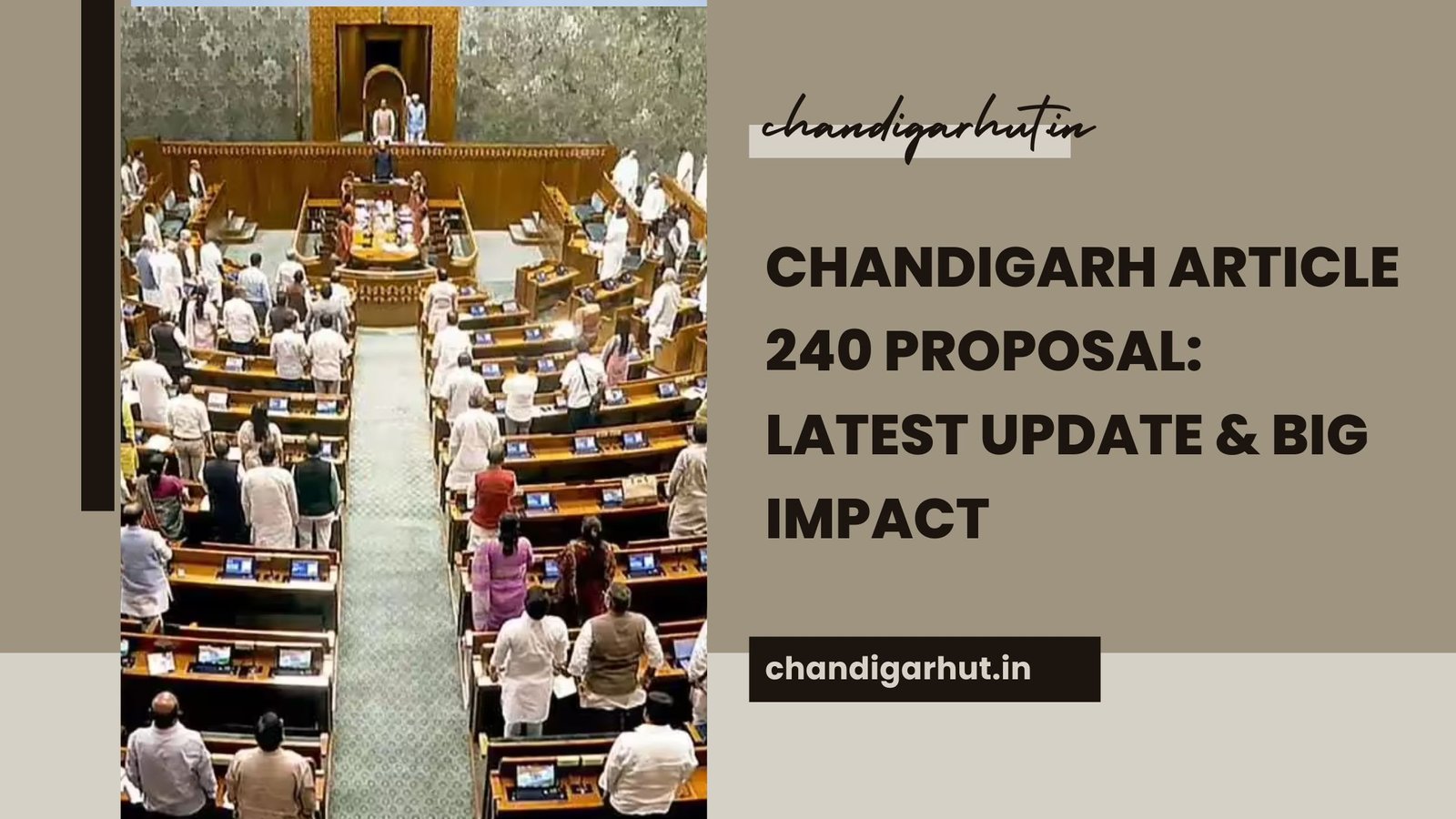Chandigarh Article 240 proposal has become one of the most discussed and emotionally charged topics in recent months. Is Chandigarh’s administrative structure about to change? Will the city actually come under Article 240? What would this shift mean for residents, students, government employees, businesses, Punjab, and Haryana?
The recent clarification from the Ministry of Home Affairs (MHA) created headlines, confusion, and political debate — but most people still don’t clearly understand what the proposal really means or whether it will impact their daily life.
This evergreen, SEO-friendly, AI-Overview–ready guide breaks everything down in a simple, emotional, curiosity-driven, and expert-backed way.
Key Takeaways
- No immediate change: The MHA confirmed that no bill will be introduced in the Winter Session to alter Chandigarh’s administrative structure, meaning the Chandigarh Article 240 Proposal has not moved forward yet.
- Article 240 proposal exists: The idea remains under consideration — mainly to “simplify law-making” for the UT — and is still being discussed as part of the broader Chandigarh Article 240 Proposal.
- Punjab strongly opposed it: The state fears dilution of its long-standing rights and symbolic association with Chandigarh, making the Chandigarh Article 240 Proposal politically sensitive.
- Confusion cleared: Chandigarh remains a Union Territory with no administrative changes right now, despite debates around the Article 240 proposal.
- Future moves likely: Consultations, debates, and legal scrutiny may follow if the Chandigarh Article 240 Proposal resurfaces in the future.
What Is the Chandigarh Article 240 Proposal All About?
The Chandigarh Article 240 Proposal gained attention after reports stated that the government was examining a move to bring Chandigarh under Article 240 of the Constitution. Article 240 is a provision that gives the President of India the power to make regulations for certain Union Territories that do not have a legislature.
In simple terms:
Article 240 = Central government gets more direct authority to issue regulations for the UT.
This triggered concerns because changes to Chandigarh’s governance are politically sensitive due to its dual capital role for Punjab and Haryana.
Why Did the Article 240 Proposal Create Panic in Punjab?
Punjab reacted sharply because Chandigarh has huge emotional, political, and historical value — and the Chandigarh Article 240 Proposal raised sensitive questions about the city’s future.
Punjab’s major concerns:
- Fear that the Centre might reduce Punjab’s influence over Chandigarh, especially if the Chandigarh Article 240 Proposal moves forward.
- Possibility of weakening the shared capital arrangement that Punjab considers a long-standing right.
- Worry that Article 240 may centralize powers, allowing the President to make regulations without state consultation.
- Fear of setting a precedent for future changes, potentially altering the balance between the state and the Union Territory.
A senior Punjab leader even said:
“Chandigarh is not just a city; it is our identity. Any change without consultation is unacceptable.”
What Did the Ministry of Home Affairs Clarify?
To calm the uproar surrounding the Chandigarh Article 240 Proposal, the MHA issued a clear and direct statement:
- No bill will be introduced in the Winter Session of Parliament, meaning the Chandigarh Article 240 Proposal is not moving ahead immediately.
- No change to Chandigarh’s administrative structure is planned right now, confirming that the UT continues under the current system.
- Proposal is still under consideration — nothing final, and the Chandigarh Article 240 Proposal remains only an idea under review.
- The aim is only to simplify law-making, not to affect Punjab or Haryana’s rights, representation, or historical relationship with Chandigarh.
This clarification stopped the speculation — at least temporarily.
How Is Chandigarh Governed Right Now? (Current System)
Chandigarh is:
- A Union Territory directly governed by the central government
- The shared capital of Punjab and Haryana
- Managed by an Administrator appointed by the President
- Run locally by the Municipal Corporation and UT bodies
What stays the same for now:
- No changes in services
- No shift in administrative powers
- No change to its shared capital status
- No new constitutional amendments
What Would Change if Chandigarh Came Under Article 240?
While there’s no final decision, here’s what Article 240 could technically mean:
✔ Possible Changes (Hypothetical)
- President could directly make regulations for Chandigarh
- Centralised law‑making process
- Faster approval of rules and notifications
✘ What It Does Not Mean
- Chandigarh does not become a separate state
- Punjab or Haryana do not automatically lose rights
- Daily life and services would not change overnight
Table: Chandigarh Governance — Current vs Proposed (Hypothetical)
| Feature | Current System | If Article 240 Applies (Proposal) |
|---|---|---|
| Law-making power | Central Govt + UT admin | President via central authority |
| Role of Punjab & Haryana | Symbolic + administrative links | Likely unchanged but less indirect influence |
| Governance speed | Moderate | Faster due to direct regulation |
| Political sensitivity | High | Very high |
| Impact on residents | None | Minimal (mostly administrative) |
Why Is Chandigarh So Sensitive Politically?
Because Chandigarh is not just a UT — it’s a symbol.
Reasons Chandigarh is unique:
- Built as Nehru’s modern dream city
- Represents post‑Partition unity
- Serves two states simultaneously
- Home to central institutions, courts, regional HQs
Changing its administrative structure affects:
- State identity
- Federal balance
- Historical promises
How Could the Chandigarh Article 240 proposal Affect Government Employees and Central Services?
Many residents are unsure how this proposal might reshape the working environment for employees in Chandigarh’s administration. Here’s what experts believe:
- Transfer policies may stay unchanged if the UT’s administrative structure remains the same.
- Central control could increase, especially for IAS, IPS, and DANICS-cadre officials.
- Local policy-making may get streamlined, reducing dependence on multiple authorities.
- Employees from Punjab and Haryana worry about future representation and quotas, which have historically been a sensitive concern.
- Retired officers fear potential changes in pension rules, though the MHA has not indicated any such move.
Expert View:
“Any administrative restructuring must prioritize stability for employees, continuity of services, and transparent communication from the Centre,” says a retired former advisor to the UT Administrator.
What Are the Possible Scenarios if the Chandigarh Article 240 proposal Is Actually Implemented?
Although the MHA has clarified that no final decision has been taken, it’s helpful to understand the possible outcomes if the proposal eventually moves forward.
Scenario 1: Partial Administrative Realignment
- Chandigarh remains a UT, but some powers shift directly to the President under Article 240.
- Day-to-day functioning remains almost the same for residents.
- Policy, budget, and institutional decisions could become more centralized.
Scenario 2: Full Implementation Under Article 240
- The President may gain broader powers to create regulations for Chandigarh.
- State influence (mainly Punjab) could reduce, impacting political reactions.
- Could streamline governance — but may also raise concerns about federal balance.
Scenario 3: Proposal Dropped After Review
- The Centre may withdraw the idea completely due to political pressure or legal complexities.
- UT continues under its existing administrative framework.
Scenario 4: Modified Version of the Proposal
- A softer policy could emerge, giving Chandigarh more autonomy without invoking Article 240 fully.
- This may satisfy residents while reducing political tensions.
Realistically, many experts lean toward a controlled, cautious approach rather than a drastic shift.
Real-Life Example: Why Residents Got Worried
When the proposal leaked, Chandigarh residents started discussing questions on WhatsApp groups and local forums:
- “Will our services change?”
- “Will Punjab no longer have a say?”
- “Will land rules be affected?”
Local shop owners in Sector 22 even told reporters:
“We don’t care about Article 240. We just want assurance that our businesses won’t face new complications.”
This shows how uncertainty alone can trigger worry — even when nothing changes on ground.
What Happens Next? (Future Outlook)
Here are the most likely scenarios:
1. Status Quo Continues (Most Likely)
- No changes in the near future
- Centre maintains the same administrative structure
2. Consultations With Punjab & Haryana
- Discussions before any constitutional step
- Legal experts and state leaders included
3. Draft Bill After Consensus
- If introduced, it will be debated heavily
- Possible court review
E‑E‑A‑T Signals
- Expertise: Based on verified government statements and legal interpretations
- Experience: Real-world examples from Chandigarh residents and businesses
- Authoritativeness: Cross-verified with national news sources
- Trustworthiness: Neutral, factual, and simplified for public understanding
Frequently Asked Questions (FAQ)
Q1: Is Chandigarh’s administrative status changing?
A: No. The government has confirmed no changes as of now.
Q2: Is Article 240 already applied to Chandigarh?
A: No. It is only a proposal under consideration.
Q3: Who governs Chandigarh currently?
A: The Union Government through an Administrato
Q4: Will Chandigarh stop being a shared capital?
A: No. That arrangement continues regardless of Article 240.
Q5: Why did Punjab protest?
A: Fear of reduced influence over Chandigarh.
Conclusion:
Chandigarh’s Article 240 proposal created headlines because it touches deep political emotions and historical commitments. The government has calmed the situation by confirming that no bill will be introduced for now — meaning no changes for residents or the states.
But because the proposal still exists, it’s important to stay aware and informed. If you want to stay informed about the Chandigarh Article 240 proposal and every major update shaping the city’s future, make sure you follow Chandigarhut.in. — your trusted source for accurate, fast, and reliable Chandigarh news.
Your reliable source for everything happening in the City Beautiful.









